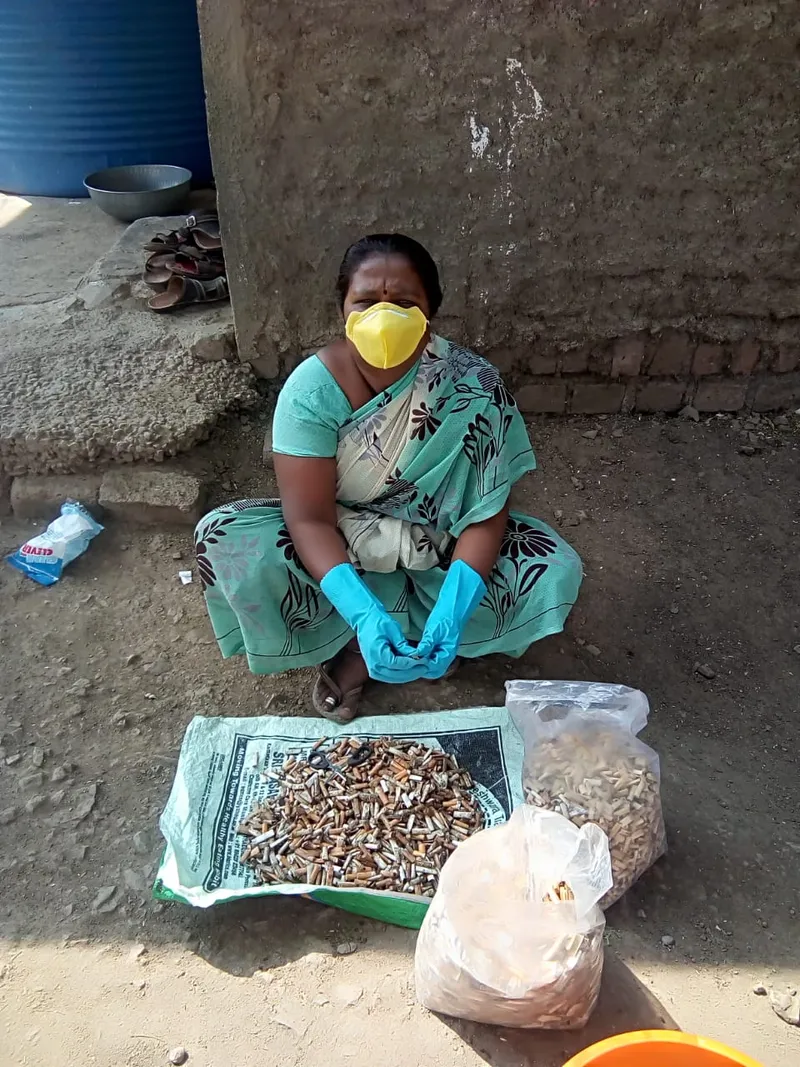How Code Effort is recycling cigarette waste for a greener tomorrow
Launched by Naman Gupta and his brother Vipul Gupta, Code Effort is a social enterprise dealing with cigarette butt waste management and recycling.
In 2024, a video showing cigarette stubs being transformed into stuffed toys went viral on social media.
Cigarette stubs, the discarded ends of cigarettes, are a significant source of plastic pollution across the world. According to the World Health Organisation (WHO), approximately 4.5 trillion stubs are discarded every year globally.
To address this growing problem, Naman Gupta, along with his brother Vipul Gupta, launched Code Effort in 2018.
“These stubs are not only litter, but also pollute soil and water due to the chemical effluents and tobacco residue in them,” says Naman.
“These stubs are made of cellulose acetate. While cellulose comes from wood pulp, the acetate essentially makes it non-biodegradable plastic,” he adds.
While various public health organisations are working to raise awareness about cigarette litter and the lack proper disposal methods, Code Effort is taking a different approach as a B2B company, recycling this waste for commercial purposes.
The startup is currently working with other firms like Reliance Retail, supplying textiles, paper, stationary, gift items, and more, all made from recycled cigarette stubs.
Today, the company recycles over five million cigarette stubs a day.
How it works
After seven months of research and trials, Naman, who was then in his third year BCom, developed a mechanism to recycle cigarette stubs along with his brother Vipul.
“The video that went viral is from 2021, when we were reusing the stubs as fibre stuffing for toys,” he says.
According to him, cigarette stubs consist of three things—tobacco, the paper covering, and cellulose acetate.
While the tobacco is turned into a compost, the paper covering is used to make paper and mosquito repellents, and the cellulose acetate is converted into fibres for yarn and textiles at Code Effort’s in-house chemical treatment plant in Noida.
“The chemical treatment makes the fibre free of any harmful residue,” says Gupta.
He explains that the recycling process begins from waste collection itself, and the startup has installed V-Bins in various places across the country to collect cigarette stubs at the source.
“Our V-Bins—made specifically for cigarette stubs, are set up around cigarette shops, commercial spaces, and smoking zones of companies and airports. We’re able to collect our raw material from the source, and it also makes smokers more conscious of discarding their stubs properly,” he says.
With over two lakh V-Bins across NCR, Maharashtra, Karnataka, and other places in India, the startup has made significant strides in waste collection.

Code Effort works with over 2,500 ragpickers, taking their help in collecting cigarette stubs.
Apart from this, Code Effort works with over 2,500 rag pickers, taking their help in collecting cigarette stubs.
“Ragpickers are the traditional stakeholders in the waste management system. We provide them with additional income to help us collect cigarette stubs,” says Naman.
Code Effort has also employed women artisans living in Nangli Village in Noida.
Varsha, a 30-year-old artisan, started working at Code Effort when she moved to Nangli Village after getting married. “I have learnt to make a variety of products and I am earning well. It feels good to live and earn with dignity,” she says.
Rajni, 23, is also an artisan employed by Code Effort. “My husband has been quite supportive of me getting this job. I’m able to support my family with this income” she shares.
Given the nature of the work and the materials involved, safety is a big concern for Code Effort.
“We hold certifications of ISO 90001, 140001, and GRS, which make our products government certified for safety, quality, and sustainability. We also have ISO 450001 to ensure safety of employees, namely those directly dealing with the stubs,” Naman says.
Code Effort is also registered under several government initiatives, such as Start Up India, MSME, and other departments.
The brothers made an initial investment of around Rs 15-20 lakh in 2018. Since 2022, the company claims to be profitable, operating without any external funding.
Creating awareness
Cigarettes, despite their harmful environmental impact, remain a highly taxed product and generates significant revenue for governments. Additionally, tobacco cultivation supports the livelihoods of many farmers in India.
“Awareness is always a key part of our work. We started by recycling 10 grams of stubs, which is equal to 30-40 stubs. Today, we are dealing with 6-7 million stubs every day,” says Naman. “This is just about 2% of the total waste generated.”
Naman believes that through large-scale orders from businesses, Code Effort is making a meaningful impact and expanding its capacity to recycle more stubs.
Terracycle, a US-based company, is another player operating in this space. Code Effort has also spread its technology in the subcontinent.
“We have transferred our technology to neighbouring countries, such as Malaysia, Nepal, and Bangladesh. We would like to expand globally as this is a worldwide issue,” Naman adds.
Being the first in its line of work in India, their vision is to expand their business by working with as many companies as possible. This can help companies also be more sustainable and environmentally conscious.
Edited by Megha Reddy






